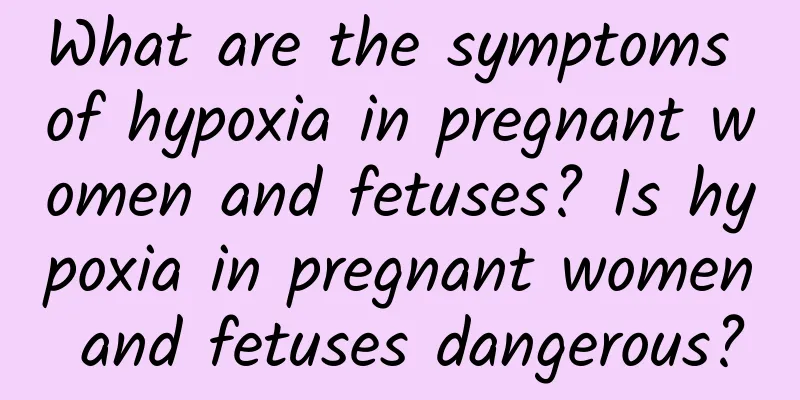What are the symptoms of hypoxia in pregnant women and fetuses? Is hypoxia in pregnant women and fetuses dangerous?

|
We all know that after a woman becomes pregnant, her body will often experience some discomfort, especially in the early and late stages of pregnancy. Many pregnant women will experience hypoxia in the late stages of pregnancy, some of which are fetal hypoxia and some are maternal hypoxia. So what are the reactions of fetal and pregnant women to hypoxia? Let's take a closer look! What happens if pregnant women are deprived of oxygen?Many pregnant women may not know that they are suffering from hypoxia, but if the following symptoms occur, pregnant mothers must be vigilant. 1. DizzinessHypoxia in pregnant women may manifest as frequent dizziness and sometimes nausea and vomiting. 2. Can’t breatheMost pregnant women will feel breathless after exercise, which is normal, but if the pregnant mother still cannot relieve the pain after sufficient rest, it may be a sign of hypoxia. 3. IrritabilityIf pregnant women often feel irritable and irritable for no reason, it may be a sign of hypoxia. What are the signs of fetal hypoxia?There are three main signs of fetal hypoxia: 1. Abnormal fetal movementGenerally, the fetal movement is significantly different from usual. For example, the fetal movement is suddenly very intense, or it suddenly stops after frequent fetal movement. 2. Abnormal fetal heart rateUnder normal circumstances, the fetal heart rate is very regular (120~160 beats/minute). If the baby's fetal heart rate exceeds the normal range, it may be a sign of hypoxia. 3. Developmental delay or stagnationIf the fetus lacks oxygen, it may lead to developmental delay or stagnation. Is hypoxia dangerous for pregnant women and fetuses?Hypoxia in pregnant women can also lead to intrauterine hypoxia in the fetus, which may cause insufficient brain development in the baby, delayed development due to bleeding, or even stopped growth. If a pregnant mother has such a problem, the first thing to do is to check to rule out heart and lung diseases in the pregnant woman herself, and then have regular prenatal checkups, and when necessary, oxygen inhalation and fetal heart monitoring will be enough. This will not cause major harm to the baby. If you find that the fetal movement decreases, you must go to the hospital immediately for further examination, such as fetal heart monitoring, B-ultrasound examination, etc. The doctor will then treat the case according to the specific situation of the pregnant woman and fetus. Whether it is pregnant women or fetuses suffering from hypoxia, we should pay attention to it. If you find any abnormality, you must seek medical attention in time. Don't bear it hard, and of course don't be too nervous. I believe that with the efforts of doctors and pregnant mothers, the baby can be well protected. |
Recommend
There are acne on the genitals and it is a bit itchy
The female private parts are not only one of the ...
Why do I feel backache and abdominal distension during ovulation?
When women have their menstruation every month, i...
How to calculate the due date if the menstrual period is irregular
We all know that women have a due date before giv...
Which is colder, the 39th day of winter or the 49th day of winter? What should you eat to nourish your body during the 39th day of winter?
It is winter now, and we are about to usher in th...
36 weeks pregnant, a little pain in the abdomen
Every mother has to go through ten months of preg...
What should I do if my 10-month-old baby has abdominal distension and indigestion? What should I do if my 10-month-old baby has indigestion and what should he eat?
Adults sometimes have indigestion due to overeati...
What to eat for triple-negative breast cancer
Triple-negative breast cancer is a special gyneco...
What causes itchy nipples during puberty?
In daily life, many women will experience itchy n...
How to deal with a small amount of bleeding at 50 days of pregnancy
In daily life, many friends will always find a sm...
Six months pregnant boy belly shape
Pregnancy and childbirth are issues that people a...
Nine tips to prevent dandruff
Both boys and girls have no way to deal with dand...
What are the precautions for moderate cervical erosion?
Cervical erosion is a very common gynecological d...
What are the causes of breast lymph node lumps?
The breast is a very important organ in the femal...
What is uterine prolapse picture
There are many female genital diseases, and uteri...
What medicine can control uterine fibroids?
Uterine fibroids are mostly caused by abnormal ho...









